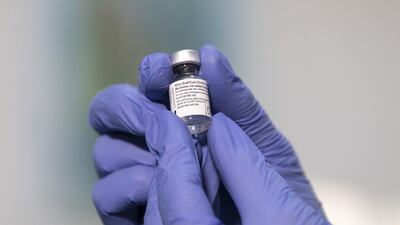The global economy is projected to grow 4 per cent in 2021 if the Covid-19 vaccine is distributed more widely throughout the year, according to the World Bank.
Policymakers must take decisive action to contain the pandemic and increase investment to drive sustainable growth or risk a subdued recovery, the Washington-based lender said in its latest Global Economic Prospects report.
The World Bank's projection is just 0.2 percentage points below its previous forecast last June following a resurgence in Covid-19 cases around the world.
"Policymakers face formidable challenges – in public health, debt management, budget policies, central banking and structural reforms – as they try to ensure that this still fragile global recovery gains traction and sets a foundation for robust growth,” David Malpass, World Bank president, said.
“To overcome the impacts of the pandemic and counter the investment headwind, there needs to be a major push to improve business environments, increase labour and product market flexibility, and strengthen transparency and governance.”
The global economy's fragile recovery comes after an estimated contraction of 4.3 per cent in 2020 triggered by the Covid-19 pandemic that plunged millions of people into poverty, subdued business, slashed incomes and claimed millions of lives. The contraction is estimated to have been "slightly less severe" than previous projections because of smaller declines than anticipated in advanced economies and a more robust recovery in China.
There are risks to this year's economic recovery as the near-term outlook remains highly uncertain, the World Bank said in its report.
In one scenario where infections continue to grow and vaccine distribution is delayed, global expansion could be limited to 1.6 per cent in 2021, the World Bank said.
However, global growth could accelerate to nearly 5 per cent with a faster vaccination process and the pandemic quickly being brought under control.
Even if the recovery proceeds as anticipated, global output is expected to remain 4.4 per cent below pre-pandemic projections by 2022.
Advanced economies will see a slow and challenging recovery this year, following a resurgence of infections, the World Bank said.
The US, which recorded its deadliest month of the pandemic in December, is forecast to expand 3.5 per cent in 2021, after an estimated 3.6 per cent contraction in 2020. In the Euro area, gross domestic product is projected to grow 3.6 per cent this year, after shrinking by an estimated 7.4 per cent in 2020.
China, the world's second-biggest economy, is expected to expand by 7.9 per cent this year following 2 per cent growth last year.
Aggregate GDP in emerging market and developing economies, excluding China, is forecast to rise 3.4 per cent in 2021 after a contraction of 5 per cent in 2020. Among low-income economies, output is projected to increase 3.3 per cent in 2021 after shrinking 0.9 per cent in 2020.
In the Middle East, GDP is expected to rise 2.1 per cent this year, recovering from a 5 per cent contraction in 2020, reflecting the dual challenges of the pandemic and low oil prices, according to the report.
"The recovery is contingent on containment of the pandemic, stabilising oil prices, no further escalation of geopolitical tensions and the assumption of a vaccine rollout in the second half of the year," the World Bank said in its regional outlook.
Among oil exporters, growth is expected to recover to 1.8 per cent this year, supported by normalising oil demand, the scheduled easing of Opec+ oil production cuts, policy support and the gradual loosening of domestic pandemic-related restrictions, it said.
The UAE economy is forecast to grow 1 per cent this year and 2.4 per cent in 2022, from an estimated 6.3 per cent contraction in 2020. Saudi Arabia's GDP is projected to grow 2 per cent this year and 2.2 per cent in 2022, after declining 5.4 per cent in 2020.
"In Saudi Arabia, activity will be supported by a resumption of public capital investment projects postponed during the pandemic and a recovery of demand after the sharp rise of the value-added tax," the report said.
The GDP of Lebanon, which is facing its worst economic crisis in its history, could decline by 13.2 per cent this year after plunging 19.2 per cent in 2020.
Risks to the Middle East's economic growth include downward pressure on oil prices, domestic political uncertainty, and geopolitical tensions, the World Bank said.
Globally, policymakers can increase the likelihood of a better economic recovery through effective pandemic control and structural reforms that boost both productivity and environmental sustainability, the World Bank said.
Measures include safeguarding health and education, prioritising investment in digital technologies, improving governance and enhancing debt transparency.
Bolstering investment in green infrastructure projects and adopting environmentally sustainable technologies can support higher growth levels while contributing to climate change mitigation, while improved governance and reduced corruption can lay the foundations for higher long-run growth.
"Increased debt transparency will be key to mitigate the risk of sovereign debt and financial crises, one of the most pressing threats to growth prospects," the World Bank said.
The pandemic has exacerbated debt risks in emerging and developing economies where weak growth prospects will likely further increase debt burdens and erode the ability to service debt, said Ayhan Kose, the World Bank's acting vice president for equitable growth and financial institutions.
“The global community needs to act rapidly and forcefully to make sure the recent debt accumulation does not end with a string of debt crises," he said. "The developing world cannot afford another lost decade."


